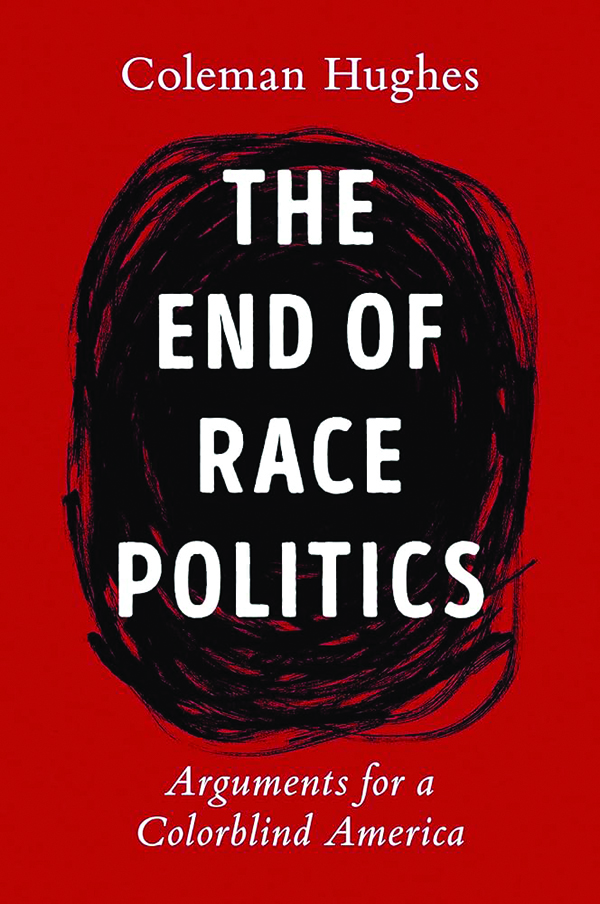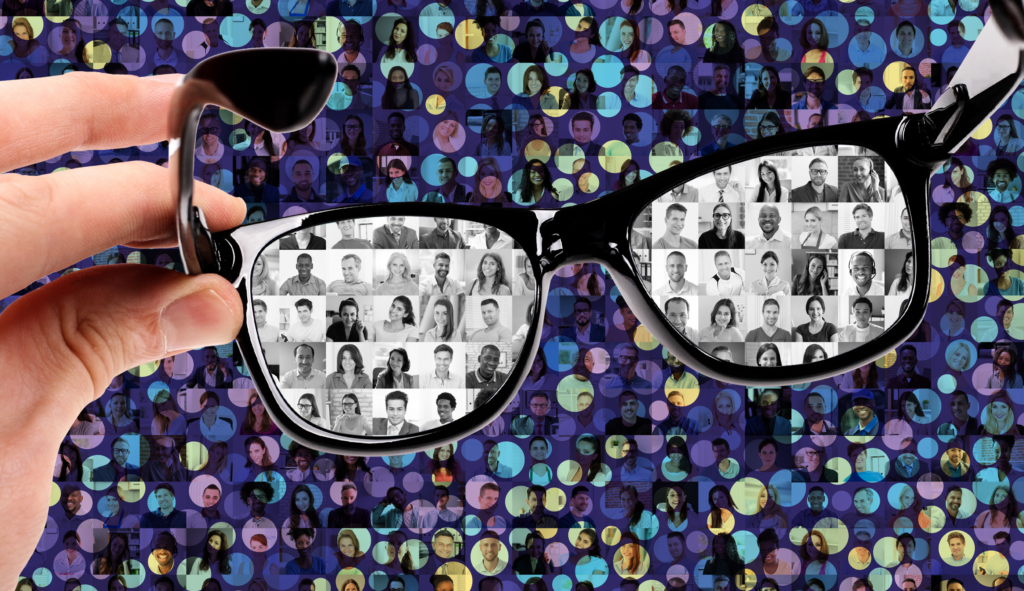Colorblindness, not the ophthalmological condition but the notion of aspiring to treat people as individuals, without regard to their race, has taken a beating these past few years. Prominent left-wing thinkers such as Ibram X. Kendi, and “anti-racist” training sessions based on their work, have painted this ideal as nothing more than a way of ignoring or hiding racism. “The only remedy to past discrimination,” Kendi famously insisted, “is present discrimination.”

Coleman Hughes, a young writer and podcast host, has stepped up to defend race neutrality in The End of Race Politics. His point is not that race is irrelevant in modern America but that we should strive to make it so — and that this is best achieved by making race less salient rather than obsessing over it.
Perhaps it’s contrary to the spirit of the book to begin with the fact that Hughes is black and Hispanic, but his background growing up mixed-race in Montclair, New Jersey, sets the scene for his arguments. One of his formative experiences was a series of microaggressions: In sixth grade, he switched from a public school to a ritzy private one, and his new peers found his afro to be quite the novelty. “What began as an understandable curiosity about my hairstyle,” Hughes wrote, “grew into a ubiquitous and apparently irresistible urge to touch it.” He ended up cutting it off.
A few years later, when he was 16, he attended the People of Color Conference. “It was there that I first heard terms like systemic racism, safe space, white privilege, and internalized oppression,” he wrote. Yet he “never imagined that the subculture I encountered in Houston would appear in my life again.”
That was 2012, a little before Hughes went to Columbia University, where an orientation activity required students to divide themselves up by race and discuss their privilege or lack thereof. Shortly thereafter, that subculture would leak out of academia and permeate the rest of society.
It would be easy, one imagines, for someone in Hughes’s shoes to lean into the rise of wokeness, leveraging his intersectionality and experiences with discrimination for points in the new competition among degree holders over who’s the most oppressed. Hughes went the other way, seeing this ascendant ideology as far more harmful than helpful, because it elevates race above everything else that makes people unique and that they struggle with. The hair-touchers he suffered as a tween were obnoxious, he noted, but others had it worse, including a friend who was an “unlucky mix of pale, skinny, nerdy, and awkward.”

From this foundation in the personal, the book lays out Hughes’s views on racial matters from the ground up. Early on, he provides an intelligent summary of what race is: a combination of biological and social realities. Human beings with different ancestral backgrounds can look strikingly different and have measurably different genetic profiles, but how, exactly, to sort people into groups is a social decision. The categories we’ve come up with can be arbitrary and unhelpful and should not be treated as reliable measures of disadvantage or imbued with the power to grant privileges in society.
In discussing racial inequality, Hughes noted experiments finding that, at least in some fields, black job applicants are about a third less likely than white ones to receive a callback. But he also noted the immense differences in income within racial groups, including among subgroups lumped together by our current classification system. Chinese and Indian Americans greatly outearn white people. Hmong and Bengali Americans earn far less. Racial discrimination is a genuine problem, in other words, but it’s hardly the sole driver of a person’s or group’s economic fortunes.
In advancing colorblindness as both the path forward and the ultimate goal, Hughes does not claim to be breaking new intellectual ground. To the contrary, he extensively documents that colorblind ideas and rhetoric were common among those who defeated slavery and felled Jim Crow — people who certainly were not endorsing this principle as a dodge to avoid confronting racism.
The use of the term dates back more than a century. Following the Civil War, Wendell Phillips and the American Anti-Slavery Society pushed for a “colorblind” Constitution, and near the end of the 1800s, Justice John Marshall Harlan, dissenting from the infamous Plessy v. Ferguson decision, insisted that the Constitution, as amended, was in fact colorblind. Thurgood Marshall, fighting segregation with the NAACP about half a century later, took great inspiration from that dissent and that passage specifically.
A. Philip Randolph, who began the March on Washington Movement in the 1940s, demanded that laws stop making distinctions based on race and said black racism and white racism are both “indefensible and dangerous to social peace and progress.” Martin Luther King Jr., aside from that worn-out line about the “content of their character,” said the Civil Rights Movement’s aim “must never be to defeat or humiliate the white man,” God cared about the freedom of the “whole human race,” and black supremacy was as bad as white supremacy. Robert L. Carter, as general counsel of the NAACP in the early 1960s, argued that the government should not even keep race statistics for social science purposes.
So the history of colorblindness shows that it’s hardly a newfangled excuse to downplay racism. Yet it doesn’t prove colorblindness is right. So what is the alternative to colorblindness in a multiracial society?
There are, of course, many degrees of color-consciousness, from a modest affirmative action coupled with firm rules of racial etiquette to brutal racial oppression. But understandably, Hughes trains most of his fire on the modern woke movement, which he dubs “neo-racism.” In short, ideologues have taken over key American institutions and used their power to demonize and disadvantage white people openly, along with, sometimes, other groups considered privileged, such as Asians, in ways that few people support. That is obviously untenable for the long term unless white people jump on the woke self-flagellation bandwagon in far greater numbers than they have.
Part of the rhetorical force of the book comes from the fact that it is shocking to see several years’ worth of controversies collected in one place. Part of the 2021 American Rescue Plan offered aid specifically to black farmers. Another part prioritized restaurant funds on the basis of the owners’ race. Several medical authorities provided early COVID-19 vaccines on a racial basis — and not merely in ways that reflected differences in risk. Institutions from the New York Times to Yale University tolerate openly racist anti-white comments by employees and invited speakers in a way they would not countenance bigotry toward other groups. A 2022 agreement negotiated by a teachers union in Minneapolis required white people to be laid off first. And on and on and on.
CLICK HERE TO READ MORE FROM THE WASHINGTON EXAMINER
Colorblindness is clearly preferable to this state of affairs — and, as Hughes shows in a late chapter of policy recommendations, it doesn’t require turning a blind eye to real problems, so long as it’s applied intelligently and flexibly. Hughes doesn’t oppose the use of race in hiring, for example, when it’s a legitimate job qualification, as might be the case if a police force won’t be seen as legitimate without some semblance of racial balance. In many cases, though, racial problems can be addressed by enforcing colorblindness rather than eschewing it: Stigmatize racist talk regardless of the target, for instance, and reduce discrimination by relying on blind hiring and grading processes. Hughes also supports closing racial skill gaps through educational efforts. Few readers will agree with Hughes on every particular, but most will agree his vision is much more attractive than that presented by anti-white mobs.
In all, The End of Race Politics is a compelling challenge to the race-obsessed ideology that has taken over the Left over the past decade, from one of the most promising rising thinkers on the intellectual scene.
Robert VerBruggen is a fellow at the Manhattan Institute.
